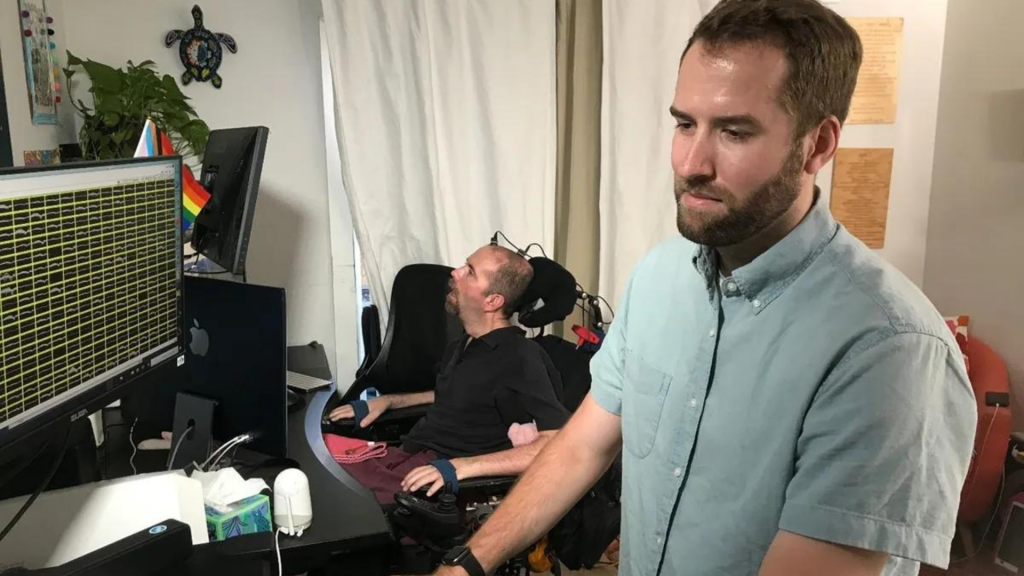Brain science has achieved a seminal breakthrough with a new brain-computer interface (BCI). Researchers at UC Davis Health have recently developed this technology to restore speech for ALS (amyotrophic lateral sclerosis) patients, translating brain signals into speech with up to 97% accuracy. After implanting sensors in the brain of a man with severe ALS-related speech loss, researchers enabled him to articulate his intended speech within minutes of activating the system.
However, despite its revolutionary impact on assistive technology for severe speech impairments, this innovation requires a thorough analysis of the associated privacy, ethical and psychological challenges.
Historical Context of Brain-Computer Interfaces
To fully understand the ramifications of this new brain-computer interface, it’s important to consider its historical background. The progression of BCIs began in the 1960s and 1970s with trailblazing experiments on primates. Early research aimed to create a direct link between the brain and external devices.
Although initial experiments faced challenges with inconsistent responses from primates, improvements in electrode technology and signal recording techniques led to greater accuracy.
The 1980s and 1990s marked a transition from experimental setups to practical applications. Technologies such as functional magnetic resonance imaging (fMRI) emerged and allowed for more detailed studies of brain activity, including the mapping of specific brain regions responsible for cognitive processes like memory, decision-making, and emotional responses, as well as the real-time observation of brain functions during various tasks and stimuli.
Meanwhile, the development of the P300 speller in 1988, which utilized Event-Related Potentials (ERPs) to facilitate communication, represented a major milestone by demonstrating the feasibility of non-invasive BCIs for direct communication.
The P300 speller achieved this by interpreting brain signals associated with visual stimuli and enabling individuals with severe motor disabilities to spell words and communicate effectively through thought alone. This period laid the groundwork for the more sophisticated BCIs of today.
As we entered the 21st century, focus transitioned to advancing algorithms and increasing accuracy. The BrainGate project exemplified these advances by using invasive BCIs to translate neural activity into control commands for external devices; for instance, a person with tetraplegia was able to control a computer cursor and communicate by typing, achieving a communication rate of approximately 15 words per minute.
This project demonstrated not only the technical progress of BCIs but also their significant potential to restore communication and independence for individuals with severe motor impairments.
New Technological Breakthroughs and Capabilities
Speech BCIs, most notably demonstrated by the device used by the late Professor Stephen Hawking and recognized for its tinny, robotic voice, illustrate a common characteristic of these technologies; however, the UC Davis Health BCI marks a significant advancement in this field.
The system implanted into Casey Harrell’s brain records signals from the precentral gyrus, a region responsible for speech coordination. This data is then decoded in real time to produce text, which the system vocalizes using a synthesized version of Harrell’s pre-ALS voice.

In initial tests, the system achieved 99.6% word accuracy with a limited vocabulary, and 90.2% accuracy with a more extensive lexicon of 125,000 words.
This technology has enabled Casey Harrell, a 45-year-old man with ALS who was previously unable to communicate effectively, to converse naturally and reconnect with his social circle. Over 248 hours of use, the system has maintained a high accuracy rate, which shows its reliability and potential for widespread application.
For patients like Harrell, BCIs have emerged as a life-changing prospect for restoring their ability to interact with others through speech; as Harrell himself said in a statement, ‘Not being able to communicate is so frustrating and demoralizing. It’s like you’re trapped.’
Privacy Concerns
Along with the sophisticated brain-reading technological achievement of this BCI, it raises a number of privacy concerns. The device’s ability to decode brain signals involves intimate and potentially sensitive information. The continuous monitoring and interpretation of neural activity necessitate stringent safeguards to protect users’ privacy.
Unauthorized access or misuse of such data could lead to serious breaches of personal information, including the potential for manipulation or exploitation, for instance, compromising financial stability through fraudulent transactions, identity theft involving sensitive personal details, or targeted phishing attacks leveraging compromised data.
Moreover, the long-term storage of brain data introduces significant risks related to data security, including potential unauthorized access or breaches that could expose sensitive neurological information, increased vulnerability to evolving cyber threats, and the challenge of maintaining the confidentiality and integrity of personal data over extended periods.
Implementing robust encryption and access control measures, such as AES-256 encryption and multi-factor authentication, is crucial for protecting users from privacy violations.
As BCIs become more prevalent, addressing these privacy concerns will be essential to preserve trust and ensure the ethical use of the technology; otherwise, misuse of sensitive information could undermine public confidence and hinder the technology’s widespread adoption.
Ethical Considerations
The ethical implications of BCIs, particularly in the context of ALS, are multifaceted. One of the primary concerns is the potential influence of BCIs on end-of-life decisions. For patients with ALS like Harrell, who often face difficult choices regarding life-sustaining treatments, the ability to communicate more effectively might alter their perspective on these decisions, as indicated by in-depth studies.
A BCI could enhance a patient’s quality of life by restoring their ability to express needs and desires.
However, it also raises ethical questions about the impact of such technologies on the decision-making process regarding life support and euthanasia. The availability of advanced communication tools may influence patients’ decisions on whether to continue or discontinue treatment, which could complicate the already challenging ethical framework.
There are concerns, in addition, about the pressure that may be exerted on patients to make decisions based on their perceived quality of life. Family members and healthcare providers might inadvertently influence these decisions, as they often prioritize immediate concerns over long-term outcomes, which could overshadow the need for careful consideration and ethical guidelines in the use of BCIs.
A recent prospective study found that 30% of patients with ALS reported feeling pressured by their families to pursue BCIs quickly, even when they were not fully informed of the risks and ethical implications; this exemplifies the urgent need for comprehensive patient education and informed consent processes in the adoption of advanced medical technologies.
Psychological Impact
BCI use for communication also has significant psychological effects. While the restoration of speech can be immensely empowering and life-affirming, it can also lead to emotional challenges.
The transition from a state of impaired communication to one where speech is facilitated by technology may bring about complex feelings of dependence or frustration, mainly due to the cognitive dissonance experienced when users reconcile their reliance on assistive devices with their desire for autonomy and the emotional impact of the technological constraints on their self-perception and social interactions.
For patients like Harrell, the joy of regaining the ability to communicate is tempered by the emotional impact of living with a severe disability. The psychological adjustment to the new communication method, coupled with the challenges of daily living with ALS, can affect mental well-being.
According to a review in Amyotrophic Lateral Sclerosis and Frontotemporal Degeneration, individuals with ALS often experience heightened levels of anxiety and depression, with a prevalence rate of up to 40% for depression and 50% for anxiety, partly due to the significant impact of losing traditional communication abilities and adapting to assistive technologies.
Ongoing psychological support such as cognitive-behavioral therapy and psychosocial counseling, and counseling by trained mental health professionals, are essential to address these issues and ensure that patients can adapt positively to their new communication abilities.
- Can LLMs generate better research ideas than humans? A critical analysis of creativity and feasibility - September 25, 2024
- Artificial Super Intelligence: Transcending Imagination - September 15, 2024
- Artificial General Intelligence: Start of a New Era - September 8, 2024



